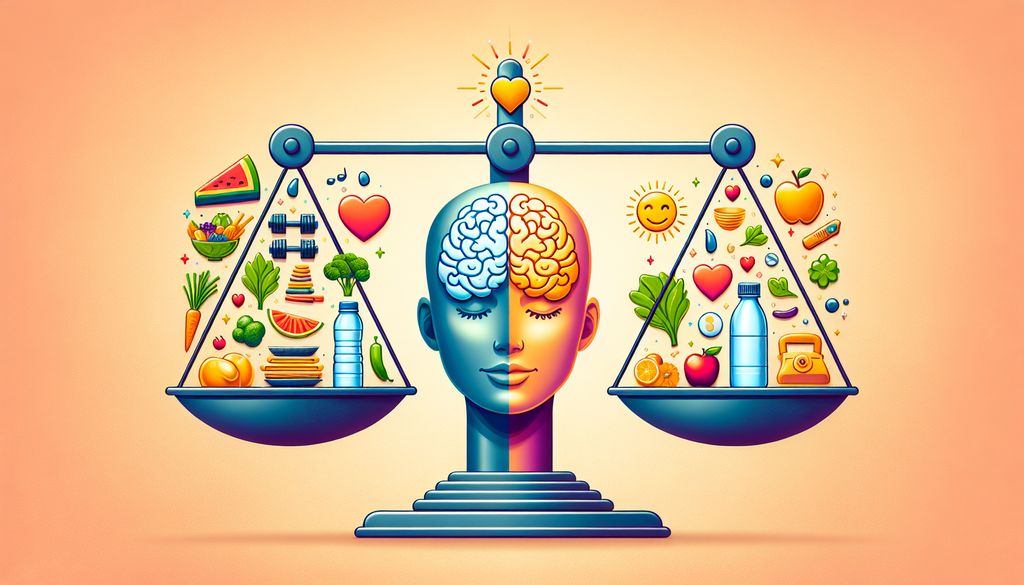In today’s fast-paced world, it can be easy to neglect our own well-being. However, prioritizing our mental, physical, and emotional health is crucial for leading a balanced and fulfilling life. This article explores the importance of prioritizing well-being and provides strategies for achieving optimal mental, physical, and emotional well-being.
Key Takeaways
- Understanding the mind-body connection is essential for achieving overall well-being.
- Recognizing the signs of imbalance can help us take proactive steps to address our well-being.
- Practicing mindfulness and meditation can significantly improve our mental well-being.
- Building a supportive social network is crucial for maintaining good mental health.
- Regular exercise and movement are key to prioritizing our physical well-being.
The Importance of Prioritizing Well-being
Understanding the Mind-Body Connection
The mind-body connection refers to the relationship between our thoughts, emotions, and physical health. It is the understanding that our mental and emotional well-being can directly impact our physical well-being, and vice versa. Positive thoughts and emotions can promote good physical health, while negative thoughts and emotions can contribute to poor physical health. Stress, for example, can manifest in the body as headaches, muscle tension, or digestive issues. Similarly, physical ailments can affect our mental and emotional state. Chronic pain can lead to feelings of frustration, sadness, or anxiety.
To better understand the mind-body connection, it can be helpful to track and observe how your thoughts and emotions influence your physical well-being. You can keep a journal to record any patterns or correlations you notice. This self-awareness can empower you to make positive changes and prioritize your overall well-being.
Here is a table summarizing the mind-body connection:
| Mind | Body |
|---|---|
| Positive thoughts and emotions | Good physical health |
| Negative thoughts and emotions | Poor physical health |
Remember, taking care of your mental and emotional well-being is just as important as taking care of your physical health. By prioritizing all aspects of your well-being, you can achieve a balanced and fulfilling life.
Recognizing the Signs of Imbalance
It is important to be aware of the signs that indicate an imbalance in your mental, physical, and emotional well-being. These signs can vary from person to person, but some common indicators include persistent feelings of sadness or anxiety, changes in appetite or sleep patterns, difficulty concentrating or making decisions, and a lack of interest or pleasure in activities that used to bring joy. Self-awareness is key in recognizing these signs and taking action to restore balance.
Strategies for Mental Well-being
Practicing Mindfulness and Meditation
Practicing mindfulness and meditation can have a profound impact on our mental well-being. Mindfulness involves being fully present in the moment, paying attention to our thoughts and feelings without judgment. It allows us to observe our thoughts and emotions without getting caught up in them, helping to reduce stress and anxiety.
Meditation, on the other hand, is a practice that involves focusing our attention and eliminating the stream of thoughts that often occupy our minds. It can help improve concentration, increase self-awareness, and promote a sense of calm and relaxation.
To incorporate mindfulness and meditation into our daily lives, we can:
- Set aside a few minutes each day to practice mindfulness or meditation.
- Find a quiet and comfortable space where we can sit or lie down.
- Close our eyes and focus on our breath, observing the sensation of each inhale and exhale.
- If our mind wanders, gently bring our attention back to our breath.
Tip: Start with just a few minutes of practice each day and gradually increase the duration as it becomes more comfortable.
Building a Supportive Social Network
Building a supportive social network is crucial for maintaining good mental well-being. Connecting with others who share similar interests and values can provide a sense of belonging and support. It is important to actively seek out opportunities to meet new people and build relationships. This can be done through joining clubs or organizations, attending social events, or participating in group activities. Engaging in meaningful conversations and listening to others can help foster deeper connections and create a strong support system.
In addition to building new relationships, it is also important to nurture existing friendships. Regularly reaching out to friends, scheduling catch-up sessions, and making time for social activities can help maintain and strengthen these connections. Supportive friends can provide emotional support, offer different perspectives, and help alleviate feelings of loneliness or stress.
Remember, building a supportive social network takes time and effort. It is important to be patient and open-minded when meeting new people. Investing in relationships and prioritizing social connections can have a positive impact on overall well-being.
Prioritizing Physical Health
Regular Exercise and Movement
Regular exercise and movement are essential for maintaining physical health and overall well-being. Engaging in physical activity on a regular basis helps to strengthen the muscles, improve cardiovascular health, and boost the immune system. It also plays a crucial role in managing stress and improving mental health.
Incorporating different types of exercise, such as cardiovascular exercises, strength training, and flexibility exercises, can provide a well-rounded approach to fitness. Cardiovascular exercises, such as running, swimming, or cycling, help to improve heart health and increase endurance. Strength training exercises, such as lifting weights or using resistance bands, help to build muscle strength and improve bone density. Flexibility exercises, such as yoga or stretching, help to improve joint mobility and prevent injuries.
To make exercise a regular part of your routine, consider the following tips:
- Schedule exercise sessions in your calendar and treat them as important appointments.
- Find activities that you enjoy and make them fun by listening to music or podcasts while exercising.
- Start with small, achievable goals and gradually increase the intensity and duration of your workouts.
- Mix up your routine to keep it interesting and prevent boredom.
Remember, consistency is key when it comes to reaping the benefits of regular exercise and movement.
Maintaining a Balanced Diet
A balanced diet is essential for overall well-being. It provides the necessary nutrients to support physical health and mental clarity. Eating a variety of foods from different food groups ensures that your body gets all the essential vitamins, minerals, and macronutrients it needs. Incorporating whole grains, lean proteins, fruits, vegetables, and healthy fats into your meals can help maintain a healthy weight, boost energy levels, and reduce the risk of chronic diseases.
To ensure you are maintaining a balanced diet, consider the following tips:
- Portion control: Pay attention to serving sizes and avoid overeating.
- Hydration: Drink plenty of water throughout the day to stay hydrated.
- Limit processed foods: Minimize the consumption of processed and sugary foods.
Tip: Plan your meals ahead of time and include a variety of colorful fruits and vegetables to ensure you are getting a wide range of nutrients.
Nurturing Emotional Well-being
Expressing Emotions in Healthy Ways
Expressing emotions in healthy ways is crucial for maintaining emotional well-being. When we suppress or ignore our emotions, they can build up and lead to stress and anxiety. It is important to find healthy outlets for our emotions, such as talking to a trusted friend or family member, writing in a journal, or engaging in creative activities like painting or playing music.
Additionally, practicing self-reflection can help us gain insight into our emotions and understand why we feel a certain way. This can be done through meditation or simply taking the time to sit quietly and reflect on our thoughts and feelings.
Remember, it is okay to feel and express a wide range of emotions. Allow yourself to experience and process your emotions in a healthy and constructive way.
Cultivating Self-Compassion
Cultivating self-compassion is an essential aspect of nurturing emotional well-being. It involves treating yourself with kindness, understanding, and acceptance, especially during challenging times. Self-compassion allows you to acknowledge your struggles and imperfections without judgment, fostering a sense of emotional resilience and self-care.
To cultivate self-compassion, you can:
- Practice self-care activities that bring you joy and relaxation, such as taking a warm bath, reading a book, or going for a walk in nature.
- Challenge negative self-talk by replacing self-critical thoughts with more compassionate and supportive ones.
- Celebrate your achievements and acknowledge your efforts, no matter how small they may seem.
Remember, self-compassion is not about being self-indulgent or selfish. It is about treating yourself with the same kindness and understanding that you would extend to a close friend or loved one. By cultivating self-compassion, you can enhance your emotional well-being and develop a healthier relationship with yourself.
Conclusion
In today’s fast-paced world, it is crucial to prioritize mental, physical, and emotional well-being. Understanding the mind-body connection and recognizing the signs of imbalance are the first steps towards achieving a balanced life. Strategies such as practicing mindfulness and meditation and building a supportive social network can greatly contribute to our mental well-being. Similarly, prioritizing physical health through regular exercise and maintaining a balanced diet is essential. Lastly, nurturing our emotional well-being involves expressing emotions in healthy ways and cultivating self-compassion. By prioritizing these aspects of well-being, we can lead happier, healthier, and more fulfilling lives.
Frequently Asked Questions
What is the mind-body connection?
The mind-body connection refers to the relationship between a person’s thoughts, emotions, and physical health. It suggests that our mental and emotional well-being can impact our physical health, and vice versa.
How can I recognize signs of imbalance in my well-being?
Signs of imbalance in well-being can manifest in various ways, such as feeling constantly stressed or overwhelmed, experiencing frequent physical ailments, having difficulty concentrating or sleeping, or feeling disconnected from oneself or others.
What are some strategies for practicing mindfulness and meditation?
Some strategies for practicing mindfulness and meditation include setting aside dedicated time for meditation, focusing on the present moment without judgment, using guided meditation apps or recordings, and incorporating mindfulness into daily activities like eating or walking.
How can I build a supportive social network?
To build a supportive social network, you can join clubs or organizations that align with your interests, attend social events or gatherings, reach out to friends or acquaintances for regular catch-ups, and actively listen and support others in their times of need.
What are the benefits of regular exercise and movement?
Regular exercise and movement have numerous benefits for physical and mental well-being. They can improve cardiovascular health, boost mood and energy levels, reduce stress and anxiety, enhance cognitive function, and promote better sleep.
How can I maintain a balanced diet?
To maintain a balanced diet, aim to include a variety of fruits, vegetables, whole grains, lean proteins, and healthy fats in your meals. Limit processed foods, sugary drinks, and excessive salt or saturated fats. Listen to your body’s hunger and fullness cues and practice mindful eating.































